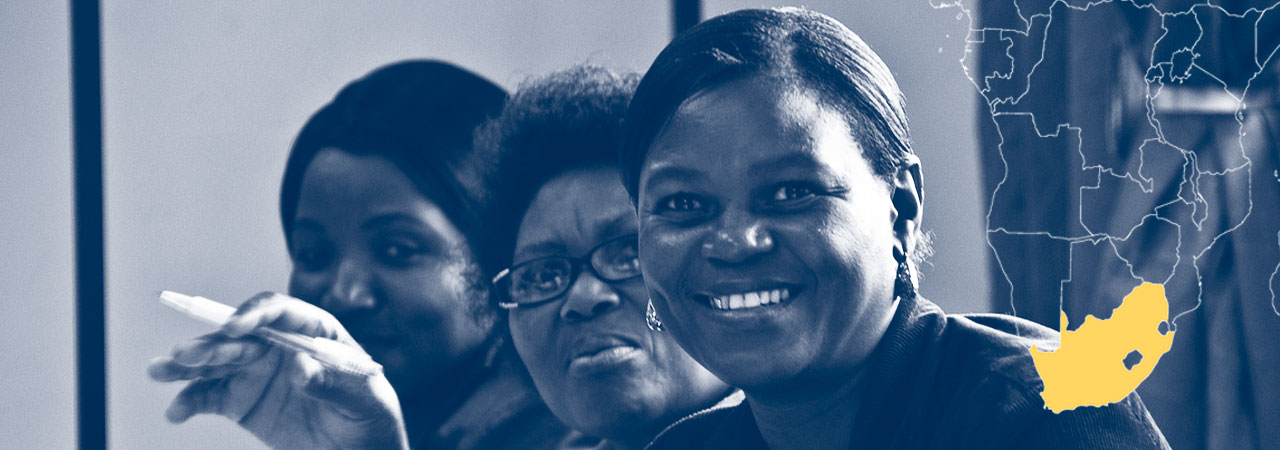I-TECH has supported the South African Government’s National Department of Health (NDoH) to strengthen its community health workers (CHWs) program so that it promotes linkage, adherence, and retention in HIV care and treatment. The program also aimed to improve HIV care and treatment, and patient outcomes by addressing knowledge and skills gaps that result in low performance related to HIV Care and Treatment indicators.
I-TECH collaborated with the NDoH, district support partners (DSPs), and educational institutions to implement a CHW skills development program to train over 22, 000 CHWs, making strides toward achieving the UNAIDS targets.
I-TECH in South Africa has helped strengthen in-service learning platforms for the training and professional development of health care workers, including SkillSMART and the Knowledge Hub.
Continue reading “Health Information Systems in South Africa”
I-TECH supported Regional Training Centers (RTCs) across provinces in South Africa to increase their capacity to coordinate in-service trainings, with an emphasis on reaching the 90-90-90 targets. I-TECH strengthened the capacity of RTC management to coordinate, consolidate, implement and evaluate training activities and supported the rollout of national priority programs such as adult primary care; training initiatives to enable nurses to deliver tests and offer services, and develop the capacity of RTCs to promote alternative service delivery models, particularly adherence clubs. Additionally, I-TECH supported the National Department of Health (NDoH) through the RTCs to roll out a national recruitment and retention strategy and in-service learning strategy, to ensure appropriate human resources for health within public health service. I-TECH also provided continuous technical support for the development of a distance learning program and supported the recruitment and placement of technical personnel at NDoH to support RTCs and offer logistical support for quarterly training review stakeholders meetings.
I-TECH South Africa supported the development, implementation, and evaluation of a comprehensive sensitization and capacity development pilot intervention with the following objective: sensitize clinical and non-clinical staff at the primary care and community levels on issues related to stigma and discrimination as they relate to five key populations (men who have sex with men, people in prisons and other closed settings, sex workers, people who inject drugs, and transgender people).
The Republic of South Africa is working to meet the health challenges facing its people, which include a high HIV prevalence compounded by high incidences of sexually transmitted infections (STIs) and tuberculosis.
In 2003, at the request of the National and Provincial Departments of Health and the U.S. Centers for Disease Control and Prevention’s Global AIDS Program, I-TECH began work in South Africa to support the government’s Operational Plan for Comprehensive HIV and AIDS Care, Management, and Treatment.
In anticipation of National Health Insurance, the key health initiatives in South Africa currently focus on strengthening the primary health care system to provide greater access to quality care to the most vulnerable populations and to reach the UNAIDS 95-95-95 goals.
I-TECH in South Africa has worked with government and community leaders, individuals, and communities to improve the effectiveness and sustainability of the South African national HIV, STI, and tuberculosis responses. In all of its efforts, I-TECH has placed an emphasis on program assessment, monitoring and evaluation, and continuous quality improvement with sustainable local involvement to ensure programs can transition to local entities.
Current Program Highlights
Past Programs
I-TECH applied the Clinical Assessment for Systems Strengthening (ClASS) methodology and tools to assess over 30 regional and local HIV care sites and facilities since 2014.
Continue reading “Quality Improvement in Ukraine”
I-TECH in Ukraine has worked to implement the Training System Monitoring and Reporting Tool (TrainSMART) via its partners, supporting adaptation of the tool per partners’ specifications and training stakeholders on its use since 2013.
Continue reading “Strategic Information in Ukraine”
A key focus for I-TECH in Ukraine is strengthening the capacity of local partners to develop and deliver high-quality clinical trainings and expand the supply of skilled health care workers.
Continue reading “Human Resources for Health in Ukraine”
To support I-TECH Ukraine during this crisis, donate to the I-TECH Humanitarian Fund.
I-TECH began working in Ukraine in 2011 at the invitation of the U.S. Centers for Disease Control and Prevention and the Ukrainian Ministry of Health. I-TECH currently supports the Government of Ukraine in implementing reforms in health services management, human resources for health, and other key areas to improve service provision for people living with HIV and achieve the UNAIDS 95-95-95 Fast Track targets.1
Ukraine is experiencing one of the fastest-growing HIV epidemics in the world, with twelve central and eastern large industrial regions of Ukraine being most affected.2 There is an estimated 260,000 people living with HIV (PLHIV) in Ukraine, 120,000 of which are women.3 Injection drug use was the main pathway for the spread of the disease from 1995 to 2008; sexual transmission, also among men who have sex with men, has been a growing primary mode of transmission.2
Ukraine has made significant progress in achieving the UNAIDS 90-90-90 targets over the past two years. As of early 2020, 68% of estimated PLHIV in Ukraine were aware of their HIV status; 80% of PLHIV, who tested positive and registered with the healthcare system, received antiretroviral therapy (ART); and 94% of PLHIV who received ART had undetectable viral loads.2
Considerable challenges remain with timely HIV testing/diagnostics in early stages, especially among hard-to-reach populations. The number of officially registered HIV cases in Ukraine also dropped in 2015-2016 as a result of the armed conflict in eastern Ukraine and due to loss to follow-up of people living with HIV in the affected regions of Donetsk and the Crimea.2
Sources
- The Cabinet of Ministers of Ukraine (CMU) (2019). The National Strategy on HIV/AIDS, Tuberculosis and Viral Hepatitis Response for the Period until 2030.
- The Ministry of Health of Ukraine (MoH) (2020). HIV in Ukraine, Information Bulletin #51, 2020.
- UNAIDS (2020). Country Factsheets: Ukraine 2020.
Program Highlights
It is critical that health care providers receive the necessary training to empower them to improve patient outcomes CHARESS supports both pre-service and in-service training efforts in Haiti. In particular, CHARESS is a key partner of MSPP in maintaining its national clinical guidelines. Continue reading “Workforce Development in Haiti”

